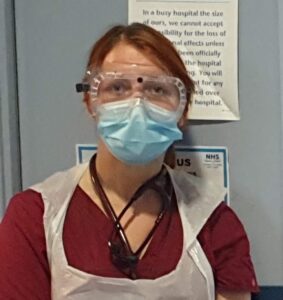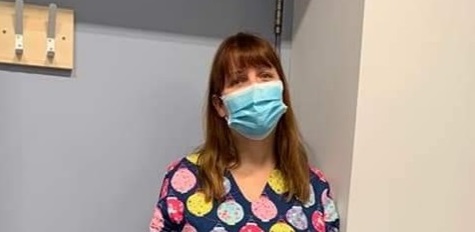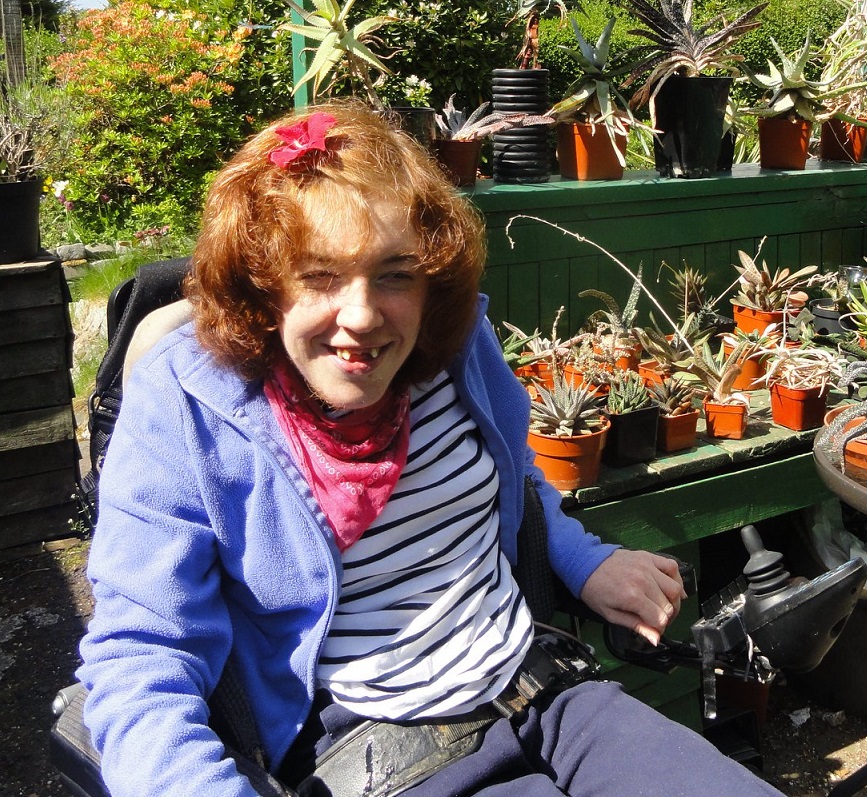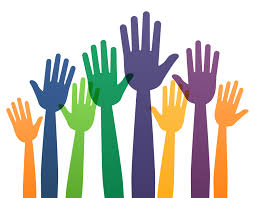Kirsty Colquhoun is a consultant geriatrician and has CP. Her blog looks at life working in a COVID ward during the pandemic, the impact of working through the crisis, asking for expert support when needed, and why #StampOutThe Gap matters to her.
The first patient I successfully discharged home from my COVID ward was an older lady with Cerebral Palsy, we were all delighted when she got home, as we were for all our patients.
I work as a consultant geriatrician in Glasgow. This means that I look after older adults, particularly those who are frailer. COVID, for the group of patients I care for has been catastrophic. Age is the biggest risk factor for having a poor outcome if you contract COVID. I have spent the past 8 months working in older adult COVID wards. At one point, Older Peoples Services, Glasgow Royal Infirmary, where I work, was looking after 10% of Scotland’s COVID inpatients.
This year has been exhausting and brutal, physically and emotionally, but whatever I have felt has never been as bad as what my patients and their loved ones have gone through. There has been tragic stories like people losing both of their parents within days of each other, that is heart-breaking to witness, and I will never forget those patients and their families. Most of the patients who I look after, would not survive an intensive care admission, however, we still deliver the highest possible care we can give, tailoring it to the needs of that patient. The first patient I successfully discharged home from my COVID ward was an older lady with Cerebral Palsy, we were all delighted when she got home, as we were for all our patients.
 However, it is not all doom and gloom in the NHS. While there can always be things you look back on and think you could have done differently, everyone working has pulled together like never before and tried their absolute best. This time last year we had no known treatment for COVID – now we have several. The scientists have worked extraordinarily hard. I was lucky enough to have the opportunity to enrol in the Oxford vaccine trial last June (and as I subsequently found out in January – lucky to have been in the COVID vaccine group). Just 6 months on that vaccine was being rolled out to give us a route out of this pandemic, which is amazing. We have tried to continue as much of our other non-COVID work as possible. For example in the work I do with older cancer patients we have been using virtual means. COVID has given us an opportunity to change the way we work and some of that may be for the better.
However, it is not all doom and gloom in the NHS. While there can always be things you look back on and think you could have done differently, everyone working has pulled together like never before and tried their absolute best. This time last year we had no known treatment for COVID – now we have several. The scientists have worked extraordinarily hard. I was lucky enough to have the opportunity to enrol in the Oxford vaccine trial last June (and as I subsequently found out in January – lucky to have been in the COVID vaccine group). Just 6 months on that vaccine was being rolled out to give us a route out of this pandemic, which is amazing. We have tried to continue as much of our other non-COVID work as possible. For example in the work I do with older cancer patients we have been using virtual means. COVID has given us an opportunity to change the way we work and some of that may be for the better.
Sadly COVID has supercharged already pre-existing inequalities. You are more likely to die of COVID if you live in a deprived area. For some there is a view that if you are older, have a disability or a chronic health condition you are somehow less valuable. That is wrong and we must push back against that mind-set. I would fall into the category of having a disability, it seems to surprise some that someone with a disability could work (more than full time) as a consultant, particularly work in COVID wards. But why, disabled people are working in all areas of society, just like everyone else. I can assure you my life is no less valuable than the next persons, nor those of any disabled person. During the pandemic there has been a focus on wellbeing and kindness. Let us come out of this a fairer society and do our upmost to tackle these inequalities. As this pandemic has shown, no one knows what the next day holds or who could acquire a disability or chronic health problem.
When we are out the other side of this we will all need time to recover. For some it will be from the grief of losing loved ones, for others it will from financial hardships, for some it will be from the exhaustion and emotional toll of trying to balance working from home with home schooling and for many it will be the from the emotional strain of the past year! A surprise challenge for me has been the physical impact the pandemic has had on my cerebral palsy.
I normally carefully balance long working hours with a mix of marathon outdoor swimming (I hoped my swimmers lungs would stand me in good stead if I caught COVID on the wards), Pilates and weights. But all that disappeared. I was standing longer at work, sitting longer at home and doing less of the things that keep me on my feet. By last month I was in much more pain than usual and my function had deteriorated to a level I cannot recall as an adult. It is at that point that you realise there is really no services easily available for adults with Cerebral Palsy except if you go to the private sector or the charity sector. I have to admit I was scared, scared that this was my new normal, and that the independence and career I had worked so hard to achieve was changing.
I have privately had to see a musculoskeletal physio, who has been a great help. However, I have had my first session with Cerebral Palsy Scotland. I have had a full top to toe MOT by a Cerebral Palsy Specialist Physio. Everything from the way I sleep to the way I stand has been looked at. I know I will not only come out the other side of this as I was but have the opportunity to come out better. This is why the #StampOutTheGap campaign is so important. People with Cerebral Palsy need and deserve the same access to specialist services as anyone else would who have a health condition or disability.
I realise I am lucky, throughout the pandemic, I have been able to come into work and do a job that I love and no matter how bad things have felt it is always a privilege to do that job and I would never want to do anything else. I have had the support and kindness of the most amazing colleagues and that human contact is something so many people have not had this year.
I work in a Department with some exceptionally inspiring people, the first female president of the Royal College of Physicians and Surgeons, the current President of the British Geriatric Society. Excellence is expected, disability or not, and that is what I want and strive for. But just as important is the ethos of kindness, support and wellbeing. I am being given the time and support to get better and I wish I could bottle the inclusivity that I experience for others. The day I had to take some time off, my COVID ward became a non-COVID ward as cases drop. I am glad I made it through to that point. I look forward to returning in a couple of weeks, I am sure better and hopefully in brighter times.
Kirsty Colquhoun: Consultant Geriatrician in NHS Greater Glasgow and Clyde, Subdean Glasgow University Medical School for Glasgow Royal Infirmary, Fellow of the Royal College of Physicians and Surgeons – Physician Representative of the Inclusion Advisory Board, Secretary for the British Geriatric Society Oncogeriatric Specialist Interest Group, Trustee CP Scotland. Has Cerebral Palsy, Diplegia.



